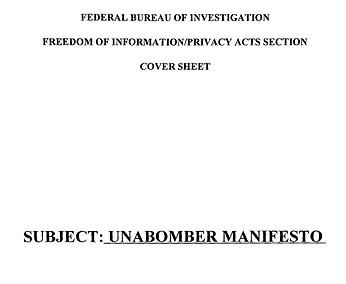Jack Brewer
Unabomber FBI Records
The FBI recently notified Expanding Frontiers Research of the existence of 56,463 pages of records potentially responsive to Theodore John Kaczynski, aka the Unabomber. The law enforcement agency also has potentially responsive digital media files in its custody, the FBI added. The notification was in response to a Freedom of Information Act request submitted by EFR.

Records on the convicted domestic terrorist were first requested in 2023. In June of that year, over 140 pages of previously released material was provided in response. The records are available for viewing, along with ongoing correspondence received from the FBI.
EFR immediately followed up with a request for all records not included in the initial June 2023 response. In a letter dated March 28, 2024, FBI responded, advising of the existence of the tens of thousands of potentially responsive records, adding the material could be processed for release at an estimated cost of $1,720. The records could be provided in 113 monthly releases, consisting of about 500 pages each. Digital media files could be contained and provided on an estimated two compact discs.
A number of options are available for ways to proceed. First of all, in a second letter dated March 28, 2024, FBI advised it denied an EFR request for a fee waiver which was part of the original request. So our first strategy included appealing the fee waiver. The appeal was submitted and remains pending as of this writing.
In the event the Department of Justice upholds the Bureau's fee waiver denial, we could always simply withdraw the request. It's an option. Other options include reducing the scope of the request, as EFR successfully executed in other FOIA cases in which we were notified of massive amounts of responsive records.
Those cases include working with the U.S. Securities and Exchange Commission when we were notified our request for records responsive to the Joseph Firmage-controlled ManyOne corporation involved some 138 boxes of hard copy and electronically maintained records. The SEC estimated 1,500 hours might be required to process and research the material. EFR subsequently reduced the scope of the request to transcripts of interviews conducted during the course of SEC investigation and any resulting reports compiled.
The negotiation ultimately led to records obtained and shared in a February 2023 blogpost, and another in April 2023. The second post resulted from records withheld during the initial release yet successfully obtained on appeal, leading to more information to report in April.
While we are pleased with such results, and feel it head and shoulders above what often masquerades as research and reporting in fringe genres, the saga demonstrates how a great deal of responsive records, covering a gamut of issues, never see the light of day. Resources such as labor, time, and money factor into untold numbers of records sitting unread in classified archives - which leads us to yet another option for dealing with the Kaczynski files at the FBI: pay for the records in the event our fee waiver appeal is denied.
After explaining the Unabomber records situation in a public post at our Patreon and initiating a poll on X/Twitter, the option to request all of the responsive records from FBI is currently leading in the poll. By a wide margin, actually, but there are indeed some circumstances to consider.
There is a lot of time involved. At 500 pages released per month for 113 months, that's over nine years, even if it stays on schedule, and it likely would not be up in the queue for a long time, which is to say it could take quite a while to even get started. That's not to say requesting all the records is out of the realm of possibility, but it should be clarified and understood the situation amounts to more than paying the fee and receiving the records.
That stated, there are indeed principles of open records access involved, and Expanding Frontiers Research is indeed an advocate of such access and government transparency. Some of our core work involves fighting for it. An argument can be made the very existence of the records begs their processing and release. In the event EFR current board members passed their responsibilities on at some future point during the records release to successor directors, a legacy of such activism and organizational purpose could be considered worthwhile and of value.

Another consideration is of course the money. Funds would have to be raised. EFR asked the FBI for further explanations of potential terms and conditions and has not received a response as of this post. At the risk of sounding negative, our past experience has indicated complex and large records requests can have years of waiting just to get started processing. It is therefore important to get as much clarification as possible from the Bureau before arriving at a decision.
Other considerations involve storing large amounts of files for public access on a website. Lots to think about, and we'd like to hear from you: our supporters and those who value our work. Let us know your thoughts and ideas. We are committed to weighing them quite heavily.
Reducing the scope of the request also needs consideration, as there are many ways it could be done. Also, there's no rule that says someone can't request different parts of the 56,000+ pages and digital media files repeatedly; just because we reduce the scope now doesn't mean we can't request more later.
Thank you for your interest and support. We look forward to hearing from you!
